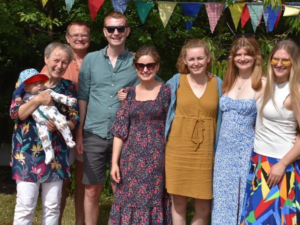METUPUK are delighted by the National Institute of Clinical Excellence (NICE) decision to recommend Talazoparib (Talzenna ®, Pfizer Ltd.) for treating HER2-negative, locally advanced or metastatic breast cancer with germline BRCA1 or BRCA2 mutations for routine use on the NHS in England.

METUPUK patient advocate Helen Stewart (left) with members of her extended family. Helen presented powerful evidence to NICE about the impact on patients and their families of living with a BRCA mutation.
Although only around 5-10% of breast cancers are caused by inheriting a faulty gene, germline BRCA1 and BRCA2 mutations are the most common cause of hereditary breast cancer. They are passed down through families and people who have a BRCA1 or BRCA2 mutation have a 50% chance of passing it to their children. BRCA mutations can be inherited by both female and male children, and they greatly increase the risk of developing certain cancers including breast, ovary and prostate.
Many people with BRCA mutations in their families are very aware with the devastating toll of cancer. There is often a history of cancer going back generations, and people have experience of watching family members live and die from cancer. Women with mutations in their BRCA genes are more likely to develop breast cancer at a younger age, when they are building their careers or have caring responsibilities for young children or elderly relatives. In men breast cancer is rare, but men with a BRCA2 mutation are 80 times more likely to get breast cancer.
Patients struggle with the worry and anguish of passing on BRCA mutations to biological children. BRCA mutations are often random and any family can carry a BRCA mutated gene. However, the prevalence in certain ethnic groups can be much higher than in the general population. For example, 1 in 40 people with Ashkenazi Jewish heritage carry a mutated BRCA gene. The impact on families of a long history of cancer cannot be underestimated.
Talazoparib is parp inhibitor, which is a small molecule drug targeted against BRCA mutated cancers. It is the most potent of the currently licensed parp inhibitors, and clinical trials show it increases the time patients have before their cancer gets worse. The drug is taken orally and its position in the treatment pathway depends on the subtype of breast cancer. For hormone positive patients, Talazoparib is expected to be used after endocrine treatment and chemotherapy. For triple negative patients it is expected to be used after immunotherapy (if eligible) and chemotherapy, but before Trodelvy. As Talazoparib is taken orally, pressure is taken off hospital chemotherapy units. And for patients, they will spend less time in hospitals and more time doing things that are valuable to them.
Helen is a METUPUK patient advocate living with BRCA2 mutated metastatic breast cancer who worked on the drug appraisal. She writes, “The approval of Talazoparib means there is a BRCA specific treatment, for the first time for patients with advanced breast cancer. Being BRCA2 brings with it feelings of guilt and dread that my faulty gene has been passed down to my children and grandchildren. Knowing that there would be a new treatment, kinder and able to give better quality of life, available to not just me, but to my children gives me hope for their future. I dread the time when I will be on chemotherapy again, so being able to access a BRCA specific drug which would mean fewer hospital visits, oral administration, less harsh side effects and therefore more time with my family and time to continue as normal life as possible, would be critical to my improved quality of life.”
Founder of METUPUK, Jo Taylor, said: “We are delighted that NICE has recommended Talazoparib for the treatment of HER2-negative, locally advanced or metastatic breast cancer with germline BRCA1 or BRCA2 mutation for patients living in England. Talazoparib is a targeted drug for patients with hereditary BRCA mutations. It is an oral drug taken once a day, and can delay the need for chemotherapy. In practical terms, this means less hospital visits and a better quality of life for patients, compared to treatment with chemotherapy.”
As a metastatic breast cancer charity we strive for access to drugs for ALL patients. We urge regulators in Northern Ireland and Wales to grant access to Talazoparib without delay. Talazoparib is currently under evaluation by the SMC for patients in Scotland, and we await their decision. We have the hope that all patients living in the UK have equal access to innovative treatments.
Improved drug access allows us to stay #BusyLivingWithMets and increase our survival outcomes.
We demand change.
METUPUK
